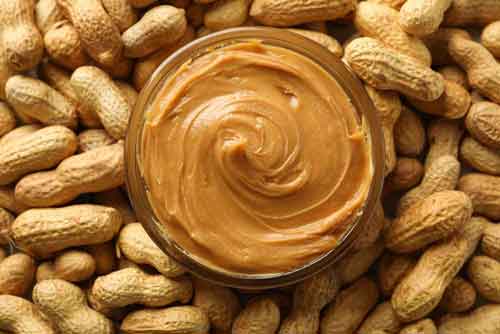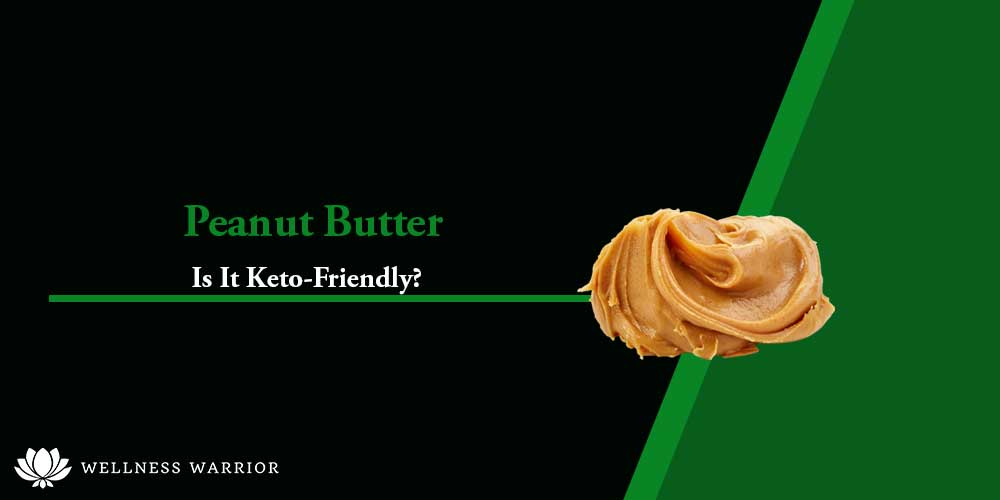Many people consider peanut butter a great snack, especially in the morning. This food can make you full even in just one serving.
According to a study in Italy, peanut butter is a low-carb food that can help you lose weight. In this study, it was also found that peanut butter is helpful for diabetic patients.
But, the question is, is peanut butter keto-friendly?
In this article, you will learn how many carbs this food contains, what are the alternatives for it, the benefits, the risks, and how you can make your peanut spread at home.
Peanut Butter: Keto Friendly or Nah?

How Many Carbs Does Peanut Butter Contain?
Ketogenic dieters need to know the protein and carb content of every food they eat.
For keto dieters who want to consume peanut spread, you will learn the carb count of this food.
According to the US Department of Agriculture, two tablespoons of peanut spread contains the following macronutrients:
- Calories – 191
- Protein – 7 grams
- Fat – 16 grams
- Total carbs – 7 grams
- Net carbs – 5 grams
- Fiber – 2 grams
Generally, peanut butter does not contain too many carbohydrates and fiber. However, if you wish to enjoy this snack, you must consume it in moderation.
As much as possible, follow your diet plan. If you wish to snack more on these, try to look for other healthy alternatives. Again, go for low-carbohydrate food to keep your body in ketosis.
Can I Eat Peanut Butter On Keto Diet?
A ketogenic diet mainly focuses on low net carb foods and since peanut spread contains low net carbs, it is safe to say that peanut spread is ketogenic-friendly.
But, when you purchase one, you have to check the nutritional label of the product as some peanut butter products contain added sugars and hydrogenated oils such as palm oil.
Added sugars and hydrogenated oils such as palm oil can increase the net carb of the product. Unfortunately, this added sugar can also kick you out of ketosis.
Aside from these, you should be mindful of the preparation of peanut butter.
Peanut desserts such as pies, candies, cakes, and cookies usually contain added sugar and often have high net carbs.
If you are on a keto and you want to consume keto-friendly peanut butter, it is highly recommended to stick with peanut butter with only nuts and salt.
Furthermore, if you are having a keto diet plan for weight loss, you should only consume less than two tablespoons of this snack as it is still rich in calories.
Other Nut Butters: Alternatives for Peanut Butter
Aside from keto-friendly peanut butter, you can also have other alternatives for this snack. Going for these alternatives is most suitable for those who cannot find pure peanut butter.
In this section, these nut butter that contains no added sugar and palm oil will be discussed.
1) Almond butter
This is a creamy peanut butter alternative that contains around 3 grams of net carbs per two tablespoons.
Almond butter is rich in vitamin E, magnesium, and manganese.
Other nut butters you can consider after this include cashew butter and sunflower seed butter.
2) Macadamia nut butter
Macadamia nut butter is also a great peanut butter keto-friendly alternative.
Two tablespoons of this nut butter offer 2 grams of net carbs.
This creamy peanut butter is best mixed with vegetable oils.
3) Hazelnut butter
Hazelnut butter is also a keto peanut butter alternative. It contains 2 grams of net carbs per 2 tbsp.
When taking this, the same rules also apply.
You must consume this keto peanut butter alternative moderately.
Benefits of Eating Peanut Butter
A keto peanut butter offers a lot of health benefits.
This food can increase your energy levels, it can be used as a pre-workout snack, and it can satisfy sugar cravings during the first stages of a ketogenic diet.
Other benefits of natural peanut butter will be discussed in this section.
1) Nutrient-dense
Natural peanut butter is rich in nutrients from macro to micro. Some of these include niacin, magnesium, sodium, potassium, and vitamin E.
2) Macronutrient ratio
Creamy peanut butter is truly delicious and aside from this, it is a low-carb snack with moderate protein content, making it perfect for those who are on a ketogenic diet.
3) Energy boost
Peanut products come with healthy fat and this fat is essential to sustain your energy levels throughout the day. Some people also take these snacks to increase their brain function.
4) Support cardiovascular health
Those who are on a ketogenic diet also aim to improve their cardiovascular health.
Luckily, consuming peanut butter products would be of great help as this food contains types of fats that can regulate blood pressure.
In a randomized controlled trial from Baltimore, it was reported that peanut butters reduce bad cholesterol.
Eventually, this can decrease the risk of cardiovascular disorders such as coronary artery disease and stroke.
5) Provides satiety
Peanut is rich in fiber. As we all know, fibers help reduce the risk of stroke and obesity.
They also support proper digestion and they can keep you full for a long period.
Eventually, consuming fibers can keep you satiated so that your cravings would be reduced. This can cause weight loss as it allows you to reduce your intake of calories.
Cons of Too Much Peanut Butter
Although consuming peanuts is found to be healthy, too much of these can also cause some health risks.
Some of the major causes of these risks are the quality of the peanut and ingredients used for peanut butters.
Some peanut butter brands contain harmful ingredients such as trans fat and unhealthy oils which may increase the risk of certain diseases such as the following:
1) Risk of heart disease
Roasted peanuts and raw peanuts are rich in fat and calories.
As published in The American Journal of Clinical Nutrition, trans fat and calories can increase the risk of heart failure.
For this reason, it is highly advised not to consume a jar of these snacks in one sitting! Keep your peanut consumption moderate.
If you can, below 2 tablespoons of peanut butter would suffice per day.
2) Risk of cancer
Trans fats are also associated with cancers. In a study from India, it was reported that high-fat food can increase the risk of developing breast cancer and colon cancer through the alteration of the immune response.
3) Inflammation
Inflammatory diseases are also associated with the consumption of peanut butter.
To avoid this inflammation, your best bet is to just take less than 2 tablespoons of peanut butter a day.
Also, stick to peanut butter brands that contain no added sugar and unhealthy oils such as palm oil.
4) Gut issues
High-fat products can also promote an unhealthy gut.
In one study from England, it was reported that consumption of fat can promote pro-inflammatory effects.
This food can stimulate inflammatory bowel diseases.
Aside from this, it can also trigger ulcerative colitis, Crohn’s disease, and colonic polyps.
5) Easy to overeat
Peanut butter and peanuts are easy to overeat.
Who would not love them?
You can easily prepare meals using this snack, right?
But, remember, they are high in calories and fat and too much of them can make you exceed your daily calorie intake.
6) Pesticide contamination
Commercial peanuts are sourced from farms and many farmers use pesticides to prevent their crops from being destroyed.
To ensure that you won’t be exposed to these pesticides, you should purchase quality peanut butter brands.
Some of these brands will be discussed in the next section.
Best Keto Peanut Butter Brands
It is important to buy the best and high-quality creamy peanut butter brands as this will help you get the benefits of this food.
In this section, you will have insights into the best brands in the market.
- Teddy All Natural Peanut Butter
- Crazy Richard 100% Peanut Butter
- Trader Joe’s Peanut Butter
- 365 Everyday Value Creamy Peanut Butter
- Kroger Natural Creamy Peanut Butter
- Smucker’s Natural Creamy Peanut Butter
Always check the nutrition label of these products. It is also advised if you would go for gluten-free brands.
Also, check the net carbs of the products you wish to buy.
Different nuts such as roasted peanuts and cashews have different carbohydrates and protein content.
Lastly, make sure that these peanut products contain no added sugar.
Products with sugar usually contain more carbohydrates and this does not make peanut butter keto-friendly.
Can You Make Your Peanut Butter?
It is also possible for you to make your peanut butter. In this way, you can assure yourself that you would be able to make healthier recipes!
To make one, all you have to prepare are your peanut choice, kosher or Himalayan salt, peanut oil or another healthy oil, honey as your sweetener, and of course, your jar.
First, you would have to roast or bake your peanuts.
Then, ground them while they are still warm. Next, run them into a food processor for a minute or until they become dry and gritty.
Add the salt, oil, and sweetener and blend the mixture again for one minute. Cool for a while and transfer the mixture into your jar.
Benefits of Making Your Peanut Spread
Many people wonder, is peanut butter keto? Generally, yes! Peanut butter is keto!
This food is low in carbohydrates but high in protein and calories.
But if you want to make sure that what you are getting is a hundred percent keto, you can try making your own!
The benefits of making your peanut spread include the following:
- You can control the consistency of the product
- You can add other keto-friendly oils
- You can skip the fat by adding no oils at all
- You can control the sodium content
Generally, if you choose to make your spread, you can control everything, including how much protein and other macros the product may contain.
Final Thoughts
Indeed, consuming peanut butters is helpful for ketogenic dieters.
They are low in carbohydrates but rich in protein, calories, and other macronutrients.
There are different types of nuts where you can source your peanut spread.
Some of the best sources are almonds, cashews, macadamias, and hazelnuts.
These snacks also offer many health benefits such as energy enhancement, cardiovascular support, and weight management.
However, although these are keto-friendly snacks, you should consume them moderately as there are some risks associated when you take too much of them.
Some of these health risks include heart problems, risk of cancer, systemic inflammation, gut issues, and exposure to pesticides.
Thus, when taking these snacks, you should only consume the right amount.
Do not overeat these butters as they can only cause weight gain.
Frequently Asked Questions (FAQs)
How much protein is there in a single serving of peanut butter?
Per serving of peanut spread usually contains 24 grams of protein. However, this protein content varies depending on the nut type used. A roasted peanut usually has 25 grams of protein while a cashew peanut usually has 18 grams of protein.
Is peanut butter keto-friendly?
Generally, yes. Peanut butter is keto-friendly. This food is suitable for those who are on a ketogenic diet. However, those who consume this should take it moderately as this food is rich in calories and fat.
How much peanut butter can I take?
Depending on your diet type, you can take at least less than two tablespoons of peanut spread per day. Ketogenic dieters should only take less than 50 grams of carbohydrates per day and a single serving of peanut spread can already provide 4 grams of carbohydrates.
